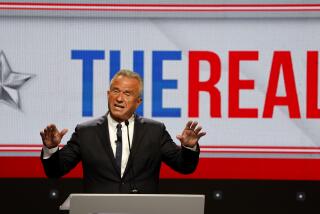It’s Kerry, the Rest in N.H.
- Share via
MANCHESTER, N.H. — John F. Kerry, rising rapidly in New Hampshire polls, Wednesday highlighted the populist themes that fueled his win in Iowa, while Howard Dean and Wesley K. Clark countered by stressing their executive experience.
The day’s campaigning saw most of the Democratic contenders adjusting to a race in which they were increasingly contrasting themselves to Kerry, rather than Dean. The candidates also scrambled to adapt to evidence that Iowa voters had rewarded Kerry and John Edwards for minimizing attacks on their rivals and emphasizing a positive message.
Together, these trends meant that after months trying to match Dean’s fervor, the Democrats mostly took a kinder and gentler path.
All of them avoided direct attacks on other candidates and several sought to tap into the currents that powered Kerry’s victory in Monday’s Iowa caucuses -- an emphasis on experience and confronting special interests.
The latest polls underscored the shift in the race since Kerry and Edwards finished one-two in Iowa, while Dean ran a distant third.
Three polls conducted Sunday through Tuesday for media outlets showed Dean clinging to a small lead over a surging Kerry, with Clark in third place but Edwards’ support growing.
A poll conducted for the Boston Globe and WBZ-TV in Boston on Monday and Tuesday showed Kerry pulling ahead of Dean, 27% to 24%, Clark backed by 17%, Edwards 9% and Joe Lieberman 4%, with 16% undecided.
A survey conducted Tuesday and Wednesday for the Boston Herald gave Kerry a 10 percentage point lead over Dean, with Clark third and Edwards rising.
Clearly buoyed, Kerry pounded Wednesday at what has become one of his favorite targets: drug companies and health maintenance organizations. Speaking in Nashua, Kerry disparaged President Bush’s promise in his State of the Union address Tuesday night to fight the rising cost of health care.
“President Bush talked a good game about making health care affordable,” Kerry said. “But ... there’s no way to bring our families affordable health care if you’re not willing to take on the most powerful organized interests in Washington.”
Kerry restated proposals to combat rising drug prices, including measures to allow importation of drugs from Canada and other countries.
The Massachusetts senator also unveiled a new television ad focusing on his populist themes and his experience, the other foundation of his message. “The only way we’re going to beat George Bush is with John Kerry’s leadership and experience,” the ad quotes one voter as saying.
When Dean emerged as the race’s frontrunner last year, most of the other Democrats sought to match his defining attributes -- anger toward Bush and skepticism about the war in Iraq. But Kerry’s rise has compelled his rivals to emphasize their own experience and to draw different distinctions than when Dean was the race’s focal point.
From the start of his campaign, Clark has stressed his background in foreign policy. But meeting with voters at a veterans hall in Plymouth, the retired Army general offered a new wrinkle.
Since Monday, Clark several times has noted that he decided to stay in the military after serving in Vietnam, implicitly contrasting himself with Kerry, who left the Navy after the war. On Wednesday, Clark praised Kerry’s record in Vietnam and the Senate. But he contrasted what he termed his “executive experience” with Kerry’s service as a legislator.
“My experience is executive experience, in the executive leadership,” Clark said when a voter asked him to distinguish his leadership credentials from Kerry’s. “As I rose up in the armed forces, I was in positions of authority where I actually had to bring people together, set tasks, motivate, and supervise the accomplishment and achievement of our objectives.”
When a supporter introducing Clark at a town hall meeting in Rochester, N.H., suggested Kerry might join “a long line of presidential pretenders from New England who ran and failed in November,” Clark quickly distanced himself from the remarks.
Dean, at a Manchester event, also avoided criticism of his opponents -- a mainstay of his stump speech in Iowa.
Instead, the former Vermont governor reiterated proposals to reduce the influence of money in politics.
Aides said his comments were a prelude to a speech today in which he will call for cutting the maximum contribution to candidates for federal office from $2,000 to $250.
Dean’s focus on campaign financing was part of an effort to steer his campaign away from the attacks on “Washington Democrats” for supporting the war in Iraq toward a message underscoring his commitment to reform and his record as governor.
Indeed, senior Dean aides acknowledge that Dean is swiping a page from the playbook of the man he often reviles: President Bush.
After losing New Hampshire’s Republican primary in 2000 to Sen. John McCain (R-Ariz.), Bush labeled himself a “Reformer with Results.”
Bush sought to convince voters he was as dedicated to reform as McCain, but better qualified to deliver it because of his experience as governor of Texas.
“That’s exactly” what Dean now hopes to do, said a senior Dean advisor.
The campaign believes in Iowa, Dean’s emphasis on his opposition to the war in Iraq and his denunciation of Washington politicians obscured his message that as an ex-governor, he could change health-care policy and work toward a balanced budget.
And that allowed Kerry and Edwards to define themselves as champions of average voters against special interests, Dean aides say.
“Our view of Iowa is that change won,” said the senior advisor. “Now the question we want to ask is what kind of change do you want? Change from Washington? Or change from a governor who has balanced budgets and delivered health care?”
His campaign has been running a radio ad in New Hampshire declaring that, “Of all the Democrats running for president, only Howard Dean has tackled the tough issues as a chief executive.”
And the campaign website Tuesday, in a distinct echo of Bush, described Dean as, “A Doctor Who’s Delivered.”
For Dean, the question is whether such a fundamental shift in emphasis can stop the erosion in his support.
Pollsters say Dean’s decline has accelerated since his frenzied speech in Iowa on Monday night as the caucus result became clear -- a performance widely ridiculed on late-night talk shows.
“Dean basically is just killing himself with his temperament,” said Gerry Chervinsky of KRC Communications, which conducts the nightly Boston Globe/WBZ tracking poll.
Still, Dean’s campaign aides said Wednesday night he had collected $590,000 since his loss in Iowa.
Kerry’s campaign said its contributions have totaled more than $500,000 since the Monday night caucuses, while aides to Edwards said his showing sparked at least $250,000 in donations.
Even Edwards, a first-term senator from North Carolina, was talking about experience Wednesday.
At a campaign stop in Roland’s Family Restaurant, a diner in Nashua, one man raised the persistent question of whether Edwards has enough experience for the White House.
“Most people believe that real-world experience matters, and I spent 20 years before I even went to the Senate fighting and winning very tough fights,” Edwards said, referring to his career as a trial lawyer.
Edwards also continued to highlight the optimistic, positive message that served him well in Iowa, based on polling of voters there. But Wednesday night, he apologized after ABC and CNN reported that his Iowa campaign distributed a guide to precinct captains directing them to raise negative arguments about Dean and Kerry at Monday’s caucuses.
Edwards said he had not known about the document, but said he would take responsibility for it. “I condemn it, it should have not have happened, and it will not happen again,” he said after a rally in Portsmouth that attracted some 400 people, his largest New Hampshire crowd so far this week.
Lieberman motored around the state Wednesday on the newly christened “Integrity One” bus. The Connecticut senator derided Bush’s State of the Union address, charging that the president overlooked the nation’s economic woes, sluggish job growth and environmental problems.
Lieberman ambled down Elm Street in Manchester, snagging bites of pizza from local vendors as he chatted up a crowd of several hundred. The stroll ended at the Merrimack Restaurant, where Lieberman appeared on CNN’s “Crossfire.”
Pressed by co-host Tucker Carlson to delineate his differences with Edwards, Lieberman returned to the message of the day for the Democrats: “Well, here’s the point -- 30 years of experience, a proven record, a willingness to stand up and say what I believe is right.”
*
Times staff writers Matea Gold, Maria L. La Ganga, Eric Slater and Scott Martelle and Times researcher Susannah Rosenblatt contributed to this report.
More to Read
Get the L.A. Times Politics newsletter
Deeply reported insights into legislation, politics and policy from Sacramento, Washington and beyond. In your inbox twice per week.
You may occasionally receive promotional content from the Los Angeles Times.










